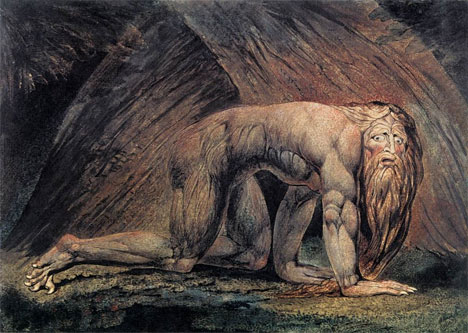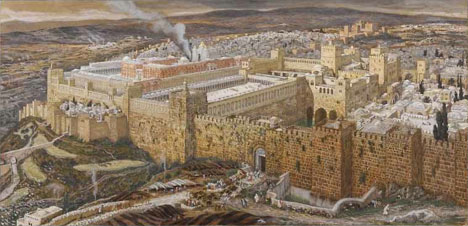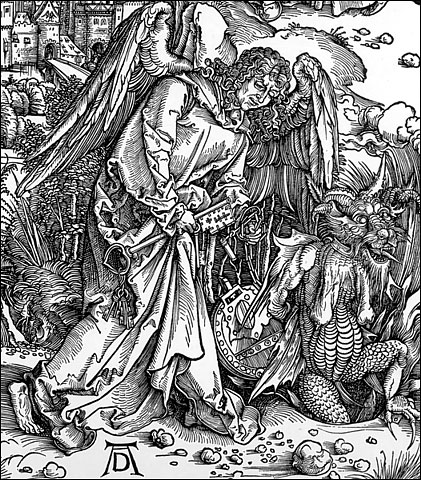Jul
5
2012
or The Undeserved Immunity of Devilish Talmudism

“For they bind heavy burdens, hard to bear, and lay them on men’s shoulders; but they themselves will not move them with one of their fingers.”
Matthew 23:4
One of the great benefits of understanding the “preteristic” nature of the New Testament is the way the many supposedly “generic” apostolic warnings in the epistles are suddenly grounded in their Jewish context. The destruction of the Temple barely gets a mention in any church today, yet when the letters of Paul, Peter, James and John are understood to be aimed at Jews outside the Church and Judaizers inside it, the New Testament doesn’t become less relevant to us, but more relevant.
Continue reading
1 comment | tags: AD70, Baptism, Federal Vision, Gnosticism, Luke, Martyrdom, Revelation, Talmud | posted in Biblical Theology, Ethics, Quotes, The Last Days
Jun
21
2012
or Blood versus Water

They answered and said to Him, “Abraham is our father.” Jesus said to them, “If you were Abraham’s children, you would do the works of Abraham… You are of your father the devil, and the desires of your father you want to do.” (John 8:39, 44)
The theme of seed and fruit, or genealogy and mission, runs throughout the Bible. Genealogy is entirely objective. Our heredity is a factor in which we have no choice. It is the tree of life. But the fruit of our lives, what we choose to do with that life, involves our volition. Volition is mission. “It’s not about the hand you are dealt; it’s about how you play it.”
Continue reading
9 comments | tags: Baptism, Circumcision, Covenant Theology, Federal Vision, Film, John, Leviticus | posted in Bible Matrix, Biblical Theology, The Last Days
Jun
19
2012
or The New Commandment
1 John 5: 1-12 | Sermon Notes | 17 June 2012

Introduction
Jewish Christians were first opposed by unbelieving Jews, then by Jews who said they believed. Members of this latter group are called “Judaizers,” and they were the false teachers whom the apostles condemn in their letters.
Not only did these men pervert the gospel by including adherence to the Law of Moses, they also failed to keep the commandments of Jesus. This was Pharisaism dressed up in Christianity, the old leaven carried into the new age. The Pharisees loved to control people, while they failed to control themselves. This is the context of John’s letters to Jewish Christians: despite their profession, these men would be exposed by their lack of of certain things in their character.
Continue reading
Comments Off | tags: Baptism, Circumcision, Covenant curse, Covenant Theology, John, Literary Structure, Mission, Pharisees, Sermons, Ten Commandments | posted in Bible Matrix, Biblical Theology, The Last Days
Jun
6
2012
 Just as the death and resurrection of Israel in Egypt follows the pattern of the Feasts, so does the death and resurrection of Israel in Babylon. [1]
Just as the death and resurrection of Israel in Egypt follows the pattern of the Feasts, so does the death and resurrection of Israel in Babylon. [1]
Continue reading
Comments Off | tags: AD70, Babylon, Covenant Theology, Daniel, Jacob, James Jordan, Jeremiah, Joseph, Nebuchadnezzar, Revelation | posted in Bible Matrix, Biblical Theology, Quotes, The Last Days, The Restoration Era
May
29
2012

“As the book of Daniel progresses, it opens in stages like a flower.”
Out of the anguish of his soul he shall see and be satisfied;
by his knowledge shall the righteous one, my servant,
make many to be accounted righteous,
and he shall bear their iniquities.
Isaiah 53:11
MarkO and I had some discussion on here recently concerning the “abomination of desolation.” Was it the massacre of converted Jews during the Roman siege, or was it simply a delayed judgment for the crucifixion of “the Righteous One”? Mark writes:
I am inclined to think that the abominable act was the slaughter of The Righteous One. I take this idea from the Sanhedrin’s rejection and condemnation of Jesus as both God and Messiah (Mark 14:61-64), Peter’s Pentecost Sermon (Acts 2:22-23), his next sermon in Acts 3 (3:14) and also from Stephen’s defense (sermon) before the Sanhedrin (Acts 7:52).
So, is it the Righteous One or the Righteous Ones?
Continue reading
Comments Off | tags: AD70, Daniel, Literary Structure | posted in Bible Matrix, Biblical Theology, The Last Days, The Restoration Era
May
23
2012

A quick historical summary of the destruction of Jerusalem for your non-preterist friends:
In AD64, Herod’s Temple was completed, and Nero burned Rome. Both events led to the persecution of Christians — the Great Tribulation.
Continue reading
9 comments | tags: AD70, Church History, Tribulation | posted in The Last Days
May
17
2012

The dreamtime is over.
The Bible teaches us that flesh is temporary. This is bad news for those who distrust God. Flesh is all they have.
Continue reading
Comments Off | tags: AD70, Baptism, Church History, Culture, David P. Goldman, Economics, Federal Vision, Politics, Postmillennialism | posted in Against Hyperpreterism, Biblical Theology, Christian Life, Quotes, The Last Days
May
2
2012
or This Is Not An Evil Age

By evil age, I do not mean the “terrible twos,” or even terrible teens. Many Christians believe they are living in the “evil age” Paul refers to in Galatians 1. They are wrong. Continue reading
5 comments | tags: AD70, Amillennialism, Covenant Theology, Dispensationalism, James Jordan, Peter Leithart, Postmillennialism | posted in Against Hyperpreterism, Bible Matrix, Biblical Theology, The Last Days
Apr
26
2012
 or A Nation of Nathans
or A Nation of Nathans
Jeremy Myers has some words to say about Gregory Boyd’s and Walter Wink’s view that political power necessarily corrupts, even demonizes, the Church:
Is There Such A Thing As A Just War?
The “Just War” theory was originally developed by Augustine to defend the Empire’s actions of arresting and killing the Donatists, with whom Augustine was having a theological disagreement. He argued that in certain situations, a war is not wrong if it furthers the cause of Christ and advances the Kingdom of God on earth.
Continue reading
2 comments | tags: Augustine, Church Discipline, Church History, Constantine, Ecclesiology, Ezra, Holy war, Nathan | posted in Biblical Theology, Quotes, The Last Days, The Restoration Era
Apr
12
2012
or The Liturgical Significance of Lot
 Part 1, The Architectural Significance of Lot’s Daughters, is here.
Part 1, The Architectural Significance of Lot’s Daughters, is here.
We’ve looked at the three-level Tabernacle structure in Genesis 19. That’s the rooms, and their doors, so what about the furniture?
The events follow the Bible Matrix, so an identification of how each step in the story fulfills the Creation Week might shed some light on the point of the details that the Spirit has included for us. And identifying how each step fulfills the Festal Calendar might also shed some light on the motivations of Lot and his daughters. The prefigurements of events nearly half a millennium in their future are breathtaking.
Continue reading
1 comment | tags: Abraham, AD70, Altar of the Abyss, Covenant curse, Feasts, Genesis, Literary Structure, Revelation, Sodom, Systematic typology, Tabernacle | posted in Bible Matrix, Biblical Theology, The Last Days


































